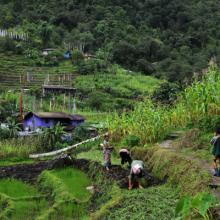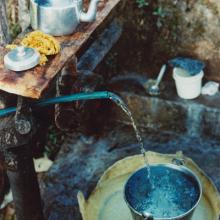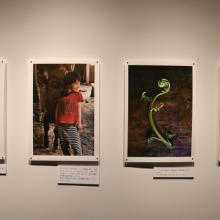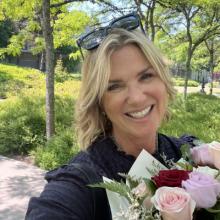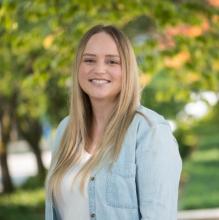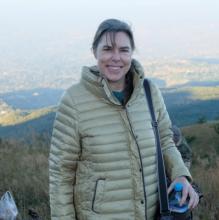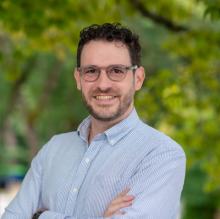2017-18 PSI Scholar and 3MT semi-finalist Saori Ogura was the recipient of the 2017 Nikon Salon Photography Award and the Nikon Miki Jun Inspiration Award for her photojournalism project documenting her time living in Sikkim and Darjeeling in India’s eastern Himalayas. Her exhibit, titled “Learning from Rong,” was named after the Indigenous Lepcha people, known also as Rongkup, who live in this region.
“I wanted to raise awareness of the issues that I'm working on. And I feel responsible for sharing my learnings to a broader audience because I was able to learn so much from my interactions in the villages in Sikkim and Darjeeling,” said the doctoral student in the Faculty of Medicine.
Saori’s current research is inspired by her time in the Himalayas. After she finished her first master’s degree, she was motivated to realize a dream she’d had since she was 14—to live in a village somewhere in the world for one year. She wanted to see the world through a different perspective. Saori moved to the northern part of Sikkim, where people still have strong connections to the forest and maintain traditional ecological knowledge.
“People used to have diversity of agricultural crops. That was replaced by monocultural cardamom. But cardamom collapsed in early 2000s and that really devastated the village economy,” she explained.
According to Saori, people are losing self-reliance and increasing dependence on external forces, outside markets, governments, agencies. Her doctoral work is focused on climate change adaption and food security issues. She hopes communities can maintain diversity of agricultural crops so they can survive through environmental changes.
“These seeds are very specific to their culture, their land, their food diet. It's not only about the crop. Around the crop, we have culture. Around the crop, we develop the relationships with the soil and with the plants and with the landscapes. That interaction and those relationships to the ecosystem are very important to create resilient communities,” she concluded.
Research Description
Climate change and food insecurity have been increasing the vulnerability of rural communities. In Mazvihwa, Zimbabwe, and in the Sikkim Himalayas, the local economies have become dependent on monocultural cash crops which were devastated by drought and plant disease. My research develops a protocol to mitigate economic risks by revitalizing indigenous crops and cropping strategies to enhance climate change adaptation. This study uniquely combines an on-the-ground study of traditional plants and their uses, using a community engagement process, satellite imagery, and network analysis. By conducting drawing workshops with community members, I will develop and advance a community science method utilizing art to enhance the process of revitalizing traditional crops. By identifying common traits from studies in Zimbabwe and the Himalayas, I will co-create a model with the indigenous communities that integrates traditional land use strategies, that is widely transferable, ultimately contributing to increased food security and climate change adaptation.
What does being a Public Scholar mean to you?
Being a Public Scholar gives me the feeling of confidence and responsibility to work with people whose voices are often unheard. As a Public Scholar, I can research while embedding myself fully in the connections with people and nature. This is PSI’s humanizing effect on my work. I do not have to miss or sacrifice what is important to the communities I work with.
In what ways do you think the PhD experience can be re-imagined with the Public Scholars Initiative?
Public Scholar Initiative provides me with the space to envision new types of research that can truly have an impact and, hopefully, contribute to human survival in the time of Anthropocene, where humanity has a tremendous effect on altering landscapes and ecosystems around the globe. It allows me to challenge the conventional research methods, makes it possible to aim for research that is collaborative, and grounded in the communities. Though co-creation of knowledge presents unique challenges, I believe it holds the potential to come up with genuine solutions to problems we are experiencing.
How do you envision connecting your PhD work with broader career possibilities?
I hope this PhD work, developing collaborative methods as well as strategies for food security and climate change adaptation, will become a base for my future career. I hope to continue working with the communities, and pushing the boundary of conventional research methods. I value the connections to communities and beings, and I believe these connections will help us overcome the challenges and uncertainties to come.
How does your research engage with the larger community and social partners?
I hope to provide a solution to different communities around the globe, facing similar issues on food security and climate change adaptation, caused by monocultural agriculturalism and less diversified livelihood strategies. I am aware it takes time to see a real change. While I continue working with the communities in Mazvihwa Zimbabwe and the Sikkim Himalayas for my PhD work, I hope to expand the network to other communities and social partners who share similar visions, and create a larger network across the globe to share the experiences and develop strategies for the upcoming challenges.
Why did you decide to pursue a graduate degree?
I found pursuing a graduate degree to be the best way to contribute solutions to pressing issues, especially because I can conduct in depth studies, staying in the field for a longer period of time. The 2011 nuclear disaster and the tsunami in Japan also spurred me to develop skills to present solutions.
Why did you choose to come to British Columbia and study at UBC?
I chose UBC because UBC has a strong interdisciplinary environment. As a Public Scholar, I became part of the highly qualified interdisciplinary academic communities where I can share my work and be inspired for the improvement of my research. I was also attracted by UBC's courses on Indigenous methodologies and traditional ecological knowledge, that are crucial for my study. I am confident that PSI will advance UBC’s reputation for socially valuable research.

